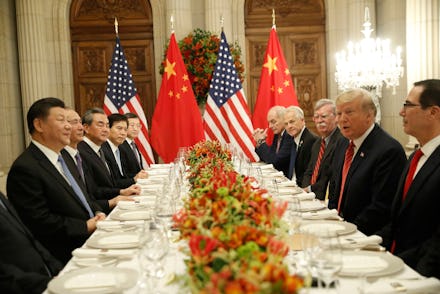Why Microsoft, Nintendo, and Sony teamed up to denounce Trump's proposed China tariffs

It's time to set aside the console wars and work together. The biggest three tech companies in the video game industry have joined forces to issue a statement against the U.S. government's proposed tariffs on Chinese imports. On June 17, Nintendo (Nintendo), Microsoft (Xbox), and Sony (PlayStation) submitted a seven-page response to the Office of the United States Trade Representative (USTR) that detailed the detrimental effects the increased tariffs would have on the video game industry.
The companies have collectively requested for the U.S. government to exclude video game consoles from the overwhelmingly long list of products that would be effected by the tariffs.
This has all came about due to a recent proposal to put additional tariffs on $200 billion worth of goods imported from China. These tariffs not only include items made in China, but also items that were made in China for U.S. companies.
Unfortunately, that means the tariffs could hit a lot of tech companies that use factories overseas, such as smartphone and PC manufacturers that make computer parts. According to the joint statement, 96 percent of video game consoles made for the United States were manufactured in China. This means the tariff costs, which would increase up to 25 percent, could pretty much hit everyone very hard.
Hoping to avoid this, the companies listed five reasons for the government to exempt video game products from additional tariffs.
- Hitting the video game industry with tariffs will be hitting a chunk of the U.S. economy. According to the document, the U.S. video game industry has earned $43.4 billion in revenue in 2018 and employs an estimated 220,000 people both directly and indirectly. The tariffs will effect a number of people, including consumers and content creators, involved in the economy.
- The supply chain for video game consoles is too complex to be moved. Consoles are made with very specific and complex parts that come together in Chinese manufacturing plants. The process is already expensive for the companies, who usually launch new consoles at an initial loss, and the tariffs would only increase the costs even further because they can't afford to disrupt their factories.
- The tariffs won't just hurt big video game companies -- it'll hurt the medium and smaller developers, too. Smaller developers rely on the larger console makers to create best-selling platforms so they can create successful games. The ripples of harm to consoles could hurt indies the most, causing layoffs to development teams and less support for developers due to costs.
- Tariffs can delay technological advancements that can also be used for other industries. The big three companies have each developed technology that has been used in places beyond the video game market. The statement uses Microsoft's motion-controlled Kinect as an example, noting that the technology has also been applied to the company's HoloLens -- which is currently in use by the U.S. Army.
- Squeezing video game consoles will not stop China's IP infringement issues. The companies made sure to express their appreciation to the U.S. government for trying to strengthen IP protection, but they insisted video game consoles should not be part of that effort. Attempts to make counterfeit consoles are few and far between due to the difficulty in making them. "Chinese developed and branded video game consoles are virtually non-existent," said the statement. "[O]ne video game console that launched in 2016 has not been well received by the market."
Whether the U.S. government will consider making an exception for consoles is unknown. The USTR is still taking comments before making the tariffs final. Console makers aren't the only ones looking to lessen the impact of these tariffs, either. Apple has already asked the government to exclude their products from the list.
There's no set date for when the new tariffs will take effect. Some companies are beginning to move their production out of China to minimize any potential harm to their businesses — but the jobs aren't going to come to the U.S. The factories are heading to places in Southeast Asia, instead. In the meantime, Bloomberg has reported that a final decision on the tariffs probably won't be made until Xi Jinping and Donald Trump meet this week during the G20 summit in Japan.